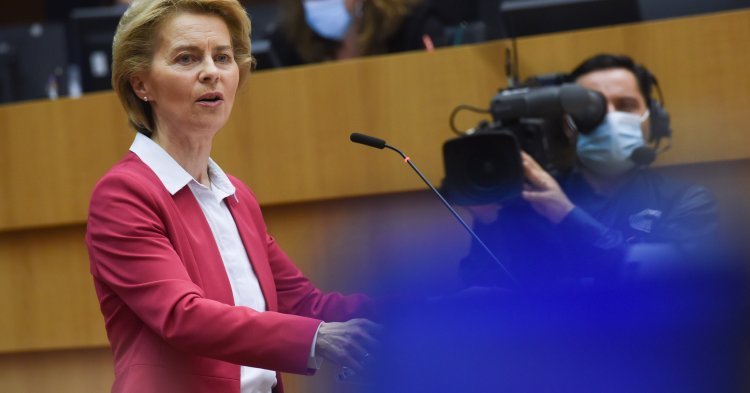It was long awaited, and did not disappoint. Yesterday, 27th May, the European Commission put forward its proposal for a budget recovery plan to limit the economic consequences – which vary hugely across the European Union - stemming from the global pandemic and the subsequent lockdown measures.
Speaking to an almost empty European Parliament (due to social distancing rules), the European Commission President Ursula von der Leyen presented the strategy that many had been longing for. Ever since the European Council Summit held on 23rd April, the Commission has been working on this recovery plan, while the Member States failed to agree on the €1 trillion cash injection. Initially announced for early May, the announcement of the Commission’s strategy was postponed several times while the last details were finalised. According to the French newspaper Le Monde, Commissioners found out the details of the whole plan right before entering the Parliament’s hemicycle.
Mutualised debts and budget transfers
In its 18-page statement, the European Commission sums up the outline of a strategy that many observers consider historic.
Titled Next Generation EU, this plan dictates that the Commission would raise €750 billion on financial markets, to be spent over a three-year period (2021-2024). €500 billion would be used as grants intended for regions and economic sectors badly hit by the coronavirus, as recommended by the Franco-German Plan put forward by Angela Merkel and Emmanuel Macron last week. The remaining €250 billion would be distributed as classic loans which recipient members would have to reimburse. Due to a distribution based on Covid-19 impact, the hardest hit countries – Italy and Spain in the first place – will be the main beneficiaries of this package: a concrete illustration of the solidarity demonstrated by this plan.
In addition, this strategy would be integrated in the next multiannual financial framework (MFF, i.e. the European budget) for 2021-2027. Ursula von der Leyen announced that the MFF would amount to €1100 billion over seven years (which would represent around 1.1% of European GDP after the UK’s departure), on top of the money it freed up to combat the effects of the virus. In total, the MFF would amount to €1850 billion, and around half of it (€900 billion) is to be spent over the first three years.
Despite the opposition from some Nordic countries, the European Commission is thus undertaking the two major innovations stemming from last week’s Franco-German plan, namely partial debt mutualisation and budgetary solidarity in the form of transfers.
It is not the first time that the Brussels institution is borrowing on financial markets on behalf of the Member States, but the amount is unprecedented. The EU benefits from a very good financial rating (AAA), and so can borrow at very low rates, even negative ones. Likewise, the €500 billion consisting in budget allocations set a precedent and gives hope for the future creation of a transfer union, essential for ensuring the cohesion of European economies and their regions.
The €750 billion would come in addition to the €540 billion mobilised by the Eurogroup at the beginning of April, and to the €1 trillion of the European Central Bank’s public bond buyback plan, announced late March. The EU would thus make €2290 billion available to relaunch the European economy, besides national plans representing trillions of euros, and the €2300 billion of state-aid approved by the Commission.
This financial windfall will have to serve the economy of the future, in particular the green transition (with the Green Deal) and the digital one. President von der Leyen insisted on the fact that each generation of Europeans had its “moment” – whether it be guaranteeing peace or the great enlargement of the 2000s; whether it be constructing the single market or establishing the single currency. “Our moment” is the one we owe to future generations, by leaving them a carbon-neutral and digital economy. The recovery plan is designed to take account of both of these.
Conditionality at the core of the Commission’s plan
Given the scale of the amounts promised, the Commission deemed it important to link the payments to economic conditions and democratic governance.
The countries benefiting from the grants will thus have to draw up investment and reform plans respecting the Commission’s priorities, regarding the green and digital transition but also economic sovereignty in the domain of health policy. Every year, the Commission will also express recommendations over the use of these funds.
Furthermore, respect for rule of law is also necessary to access these funds. Apart from the European Greens (who advocate for unconditional use???? of the funds), all parliamentary groups leaders in the hemicycle supported the proposal that Ursula von der Leyen put forward – that use of the funds be subject to conditions. This measure indeed seems necessary because here, from a legal standpoint, the Commission has often been seen to be impotent faced with rule of law transgressions within certain member states. By proposing conditionality, the European executive has armed itself with a substantial financial incentive for member states to respect the Union’s values.
European budget: the battle for own resources
The sustainability of the political achievements of this plan is not guaranteed, however. In response to the question from journalist Christian Spillman on the possible creation of a European treasury, the President of the Commission rejected this idea (at least in the way it was expressed) in a manner that may have reassured the “frugal” countries. For Ursula von der Leyen, Next Generation EU is a “one-off” plan, a temporary one to cover the time it will take to overcome the economic consequences of the crisis.
This is where the challenge of the European budget’s own resources lies. Through this mechanism, the Commission intends to convince the refractory states. The €750 billion will indeed have to be repaid between 2028 and 2058, presumably based on States’ contributions to the European budget for grants, as well as direct repayments for loans.
Own resources could be the solution for freeing up more money without increasing the contributions of member states. Currently, they represent less than 20% of the total budget (mainly in the form of customs duties and VAT) and are limited to 1.2% of member states’ total GNI. The Commission is proposing to increase this ceiling to 2%, allowing it to set up its own financial levers, such as the carbon tax, a proposal already made in the context of the Green Deal, or a GAFAM tax on digital giants.
Difficult negotiations ahead
“Negotiations will be difficult”. These are the words of Angela Merkel following President von der Leyen’s speech. And for good reason, as the next European summit will be held on June 18th and 19th and will be on the “increased” version of the budget. In February, the discussions were cut short. The Frugal Four were already on the move, at the time supported by Germany. They aimed to maintain the European budget below 1% of the Union’s GNI. With the current proposal, the budget would barely exceed 1.1%, almost meeting the requirements of the Frugals.
“Next Generation EU” would, however, allow a back door increase in the European budget, at least for the first years. It would be a good way to get around the Frugals’ “no”: on the one hand we would meet (just) the 1% requirement; on the other, we only indirectly increase the European budget through a temporary stimulus fund.
Faced with this “concrete achievement creating a budgetary solidarity de facto”, it would be difficult for the Frugal Four to oppose a dismissal. To do this, they should take responsibility for the sinking, or even the destruction, of the European project. The survival of the Union is at stake, after all.
Of course, they will not accept all the conditions of this plan, but they will not be able to oppose its very essence: the principle of solidarity. The Austrian Prime Minister seems to have understood this as he quickly declared that the plan was the “starting point” of the negotiations. There is no longer any question of firmly opposing it, as he has done in these past few days.
A “Hamiltonian” moment towards a federal Europe?
When the Franco-German plan was announced last week, which paved the way for a partial pooling of European debt, much of the media, Anglo-Saxon in particular, talked about a “Hamiltonian” moment for the EU, referring to the American politician Alexander Hamilton. At the end of the 18th century, Hamilton succeeded in convincing the American Congress to issue national debt, a prerequisite for the federalisation of the United States, and therefore for its sustainability.
Will the coronavirus crisis be the opportunity to strengthen European institutions towards more integration? This plan could lead to greater autonomy of the EU in relation to the Member States, with both a European Parliament that is fully integrated into European decisions and by gradually abandoning the unanimity voting rules in the Council, especially when voting for the budget. Despite the magnitude of the task that remains to be accomplished, the ambition of the plans proposed by France, Germany and the European Commission suggests there is hope for a Hamiltonian leap towards a federal Europe.




Follow the comments: |
|
